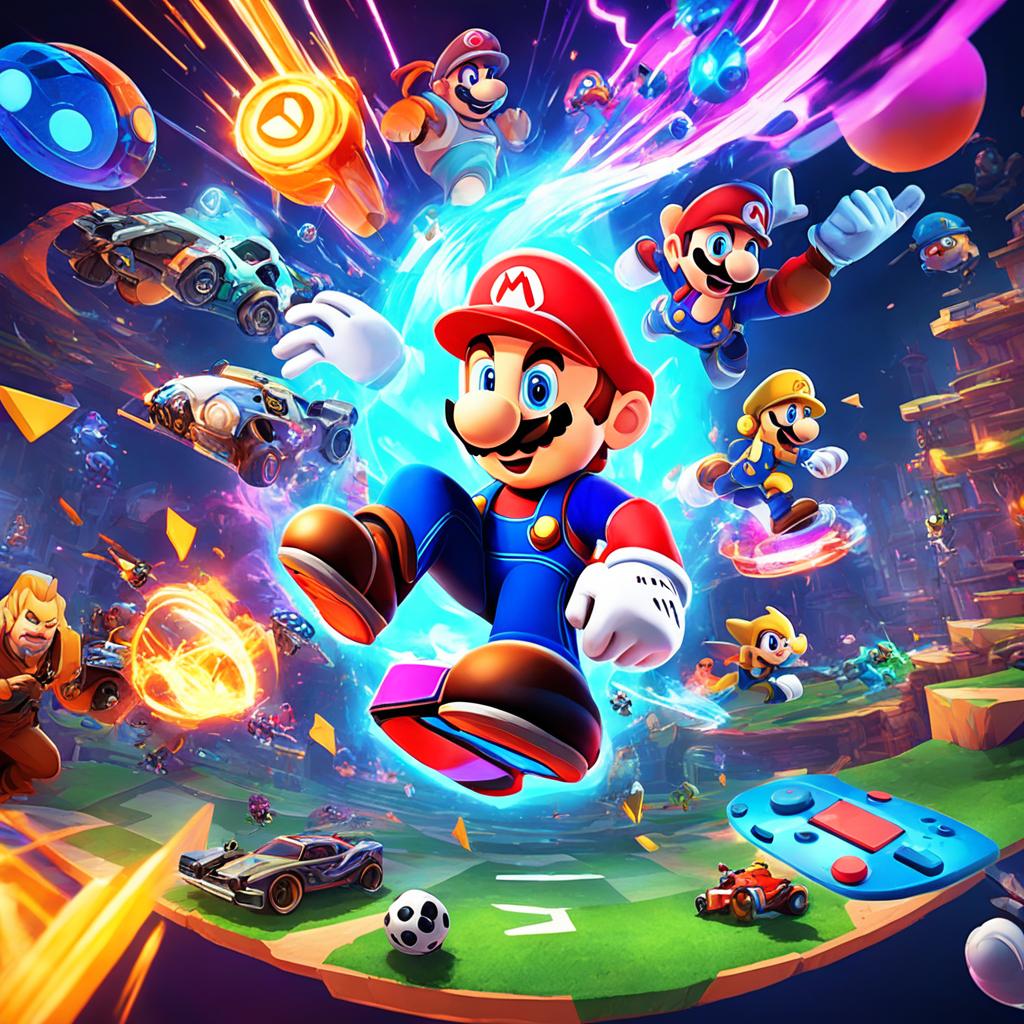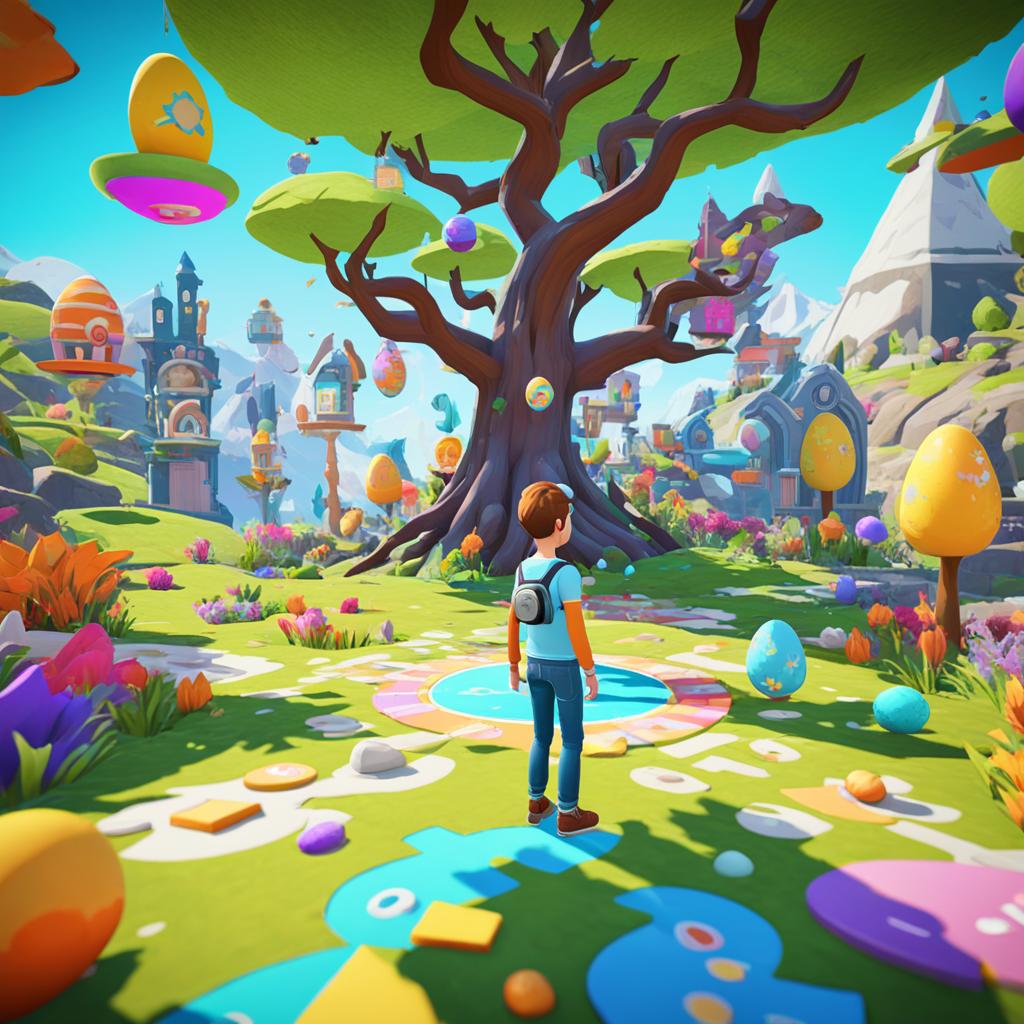Did you know that the global video game industry generated $159.3 billion in revenue in 2020? It’s clear that gaming has become a massive phenomenon, captivating millions of people around the world. But what is it about gaming that makes us so hooked? In this section, we will explore the psychology of gaming and uncover the reasons why people become deeply engrossed in the virtual worlds of their favorite games. We will also discuss the fine line between a healthy passion for gaming and the potential for addiction, shedding light on the impact it can have on individuals’ lives and relationships.
The Appeal of Video Games
Video games have a unique appeal that captures the hearts and minds of millions around the world. The immersive virtual worlds, the sense of achievement, and the social aspects all contribute to the allure of gaming.
One of the primary reasons video games have such widespread appeal is the opportunity they provide to escape reality. Within these virtual worlds, players can leave behind their daily stresses and responsibilities, immersing themselves in captivating narratives and fantastical environments.
The concept of immersion is central to the appeal of video games. Through stunning graphics, sound design, and even virtual reality technology, games transport players to new realms where they can fully engage their senses. This immersion creates a sense of presence and excitement, making the gaming experience truly captivating.
Additionally, the sense of achievement that comes with gaming is a major driving factor for many players. Completing challenging levels, defeating formidable adversaries, and unlocking rare items or abilities provide a unique sense of accomplishment and satisfaction. This feeling of progress and success keeps players motivated and eager to continue their gaming journey.


Furthermore, the social element of gaming cannot be overlooked. Online multiplayer games and gaming communities offer opportunities for players to connect and collaborate with others who share their interests. Through teamwork, competition, and shared experiences, gamers build friendships and form communities that extend beyond the virtual world.
To summarize, the appeal of video games is multifaceted. The immersive virtual worlds, the sense of achievement, and the social interactions all contribute to the captivating nature of gaming. Whether it’s the thrill of exploration, the joy of overcoming challenges, or the camaraderie of playing with others, video games have a unique appeal that continues to capture the hearts of countless individuals.
The Role of Escapism
When it comes to gaming, one aspect that cannot be underestimated is the role of escapism. Video games provide a unique opportunity for individuals to escape from the realities of everyday life and immerse themselves in virtual worlds filled with adventure and excitement.
Escapism, in essence, offers a temporary relief from the stresses, anxieties, and monotony that often plague our daily routines. It allows individuals to step into the shoes of a different character or persona, embarking on thrilling quests and overcoming seemingly insurmountable challenges.


The appeal of escapism in gaming lies in its ability to transport players to fantastical realms, where they can freely explore new worlds, build their own narratives, and experience emotions that are often elusive in reality. This escapism can be an essential form of self-care, providing a much-needed break from the pressures of the real world.
For many, gaming serves not only as a means of entertainment but as a means of refuge. It offers a safe haven where players can temporarily forget their worries, responsibilities, and obligations. The immersive nature of video games, coupled with captivating storytelling and stunning visuals, creates an environment that is both captivating and therapeutic.
“Through the medium of video games, people can transcend their present circumstances, fulfilling desires and exploring possibilities they may not have in their everyday lives.” – Jane McGonigal
Escapism through gaming provides not only a break from reality but also an opportunity for personal growth and self-discovery. It allows individuals to test their skills, strategize, and problem-solve in a controlled environment, which can ultimately contribute to their overall development.
It is vital, however, to strike a balance between the role of gaming as a form of escapism and the responsibilities of real life. While escaping into virtual worlds can offer respite, it is essential to remember that it should not become a substitute for genuine human connections and the pursuit of real-world goals.
As with any form of entertainment, moderation is key. By recognizing the role escapism plays in gaming and understanding the need for responsibility, individuals can fully immerse themselves in the captivating worlds of video games while maintaining a healthy balance in their lives.
The Intricacies of Game Design
Game design is not merely the arrangement of graphics and sounds; it is an art form that intricately weaves together various elements to create an immersive experience for players. Every game is carefully crafted to captivate and engage its audience, with the psychology of players in mind.
The Elements of Game Design
At its core, game design encompasses a range of intricacies that work harmoniously to shape the player’s journey. Game mechanics, the rules and systems that govern gameplay, form the foundation of a game’s design. These mechanics determine how players interact with the game world, the challenges they face, and the strategies they employ to overcome obstacles.
In addition to game mechanics, rewards systems play a crucial role in player engagement. Rewards provide motivation and reinforce the desired behavior, encouraging players to continue progressing through the game. Whether it’s earning points, unlocking new levels, or obtaining virtual items, rewards create a sense of accomplishment and drive players to keep playing.
The Power of Storytelling
Storytelling is another key aspect of game design that deeply influences player engagement. Just as in books and movies, a compelling narrative creates an emotional connection with players, immersing them in the game world and driving their desire to progress. From intricate plotlines to memorable characters, storytelling in games adds depth and meaning to the overall experience.
The intricacies of game design lie in its ability to seamlessly blend game mechanics, rewards systems, and storytelling techniques. Together, these elements create a harmonious and captivating experience for players, drawing them into the world of the game and keeping them hooked.
As game designers continue to push boundaries and explore new possibilities, understanding the intricacies of game design becomes essential. By carefully crafting and balancing these elements, game designers can create unforgettable experiences that resonate with players on a psychological level.


Next, we will explore the power of immersion and how games transport players into dynamic and lifelike virtual worlds.
The Power of Immersion
Immersion is a fundamental aspect of gaming that enhances the player’s experience by captivating their senses and transporting them to alternate realities. Through the strategic use of graphics, sound design, and virtual reality (VR) technology, game developers have unlocked the power to create deeply immersive worlds that engage players on a profound level.
Graphics play a vital role in shaping the visual atmosphere of a game. High-resolution textures, realistic lighting effects, and intricate details bring the virtual world to life, allowing players to feel like they are part of the action. Whether it’s the lush landscapes of an open-world adventure or the gritty environments of a post-apocalyptic setting, visually stunning graphics contribute to the immersive nature of the game.
“Immersive gaming experiences have the potential to transport players into new realms of imagination and excitement.”
– Gaming industry expert
Sound design is another critical aspect that contributes to immersion. The careful placement of sound effects, ambient noises, and a dynamic soundtrack can create an audio landscape that complements the game’s visuals and enhances the player’s emotional connection to the virtual world. From the subtle whispers of the wind to the booming explosions of a battle, every sound element is meticulously crafted to enhance the immersion and evoke powerful emotions in the player.
Virtual reality (VR) technology has revolutionized the gaming industry by offering players an unparalleled level of immersion. With VR headsets and motion controllers, players can step into virtual realms and interact with the game environment in a way that feels incredibly realistic. The ability to physically turn their heads, touch virtual objects, and navigate the world using their own movements adds a new dimension of power to the immersive experience.
By harnessing the power of immersion, game developers can create memorable and captivating experiences that transport players to extraordinary worlds. Whether it’s through stunning graphics, expertly crafted sound design, or groundbreaking VR technology, the immersive nature of gaming continues to astound and captivate players worldwide.
The Psychology of Achievement


Within the gaming world, the psychology of achievement plays a crucial role in captivating players. Many gamers are drawn to the sense of accomplishment and fulfillment that games offer, which can be deeply satisfying on a psychological level.
At its core, the psychology of achievement is driven by the desire for progress, growth, and mastery. Games provide a structured environment where individuals can set goals, overcome challenges, and experience a tangible sense of achievement when they succeed.
One psychological factor that fuels the pursuit of achievement in gaming is the concept of self-efficacy. According to psychologist Albert Bandura, self-efficacy refers to an individual’s belief in their ability to succeed in specific situations. When gamers overcome difficult obstacles or achieve significant milestones, their self-efficacy is reinforced, resulting in increased motivation and a desire for further accomplishment.
Game designers leverage various techniques to enhance the psychology of achievement. They employ engaging progression systems that reward players for their efforts, such as experience points, leveling up, and unlocking new abilities. These rewards stimulate the release of dopamine in the brain, creating a sense of pleasure and reinforcing the desire to achieve more.
“The pursuit of achievement in gaming often mirrors our innate drive for progress and mastery in real life.”
Understanding the psychology of achievement in gaming has broader implications beyond the virtual world. The skills and mindset developed through gaming, such as goal-setting, perseverance, and strategic thinking, can translate into real-life success. Furthermore, the sense of achievement and self-esteem gained from gaming can positively impact overall well-being.
However, it is essential to strike a balance between the pursuit of achievement in gaming and other aspects of life. Excessive focus on gaming achievements can lead to neglecting responsibilities and other areas of personal growth. Recognizing and managing the psychological pull of achievement in gaming is crucial for maintaining a healthy and balanced lifestyle.
The Social Element of Gaming
Gaming has undergone a remarkable transformation, evolving from a solitary pastime to a highly social activity. With the advent of online multiplayer games and expansive gaming communities, players now have the opportunity to connect and interact with fellow gamers from around the world. This section delves into the social aspects of gaming, exploring how it fosters the formation of friendships, encourages collaboration, and fuels healthy competition.
One of the key attractions of gaming is the ability to forge meaningful connections with like-minded individuals. Whether it’s teaming up with friends or collaborating with strangers, multiplayer games provide a platform for players to engage in shared experiences and build lasting bonds. Through cooperative gameplay and strategic communication, gamers develop teamwork skills and cultivate relationships that extend far beyond virtual realms.
“Gaming allows me to connect with people who share my passion. It’s amazing how friendships can grow from simply enjoying a game together.”
Furthermore, gaming offers a unique avenue for collaboration. Many games encourage players to work together towards common objectives, fostering cooperation, and communication. Whether it’s coordinating strategies in a raid or supporting teammates in a competitive match, collaboration in gaming requires effective teamwork and enhances players’ ability to solve problems collectively.
“Gaming is a great way to practice teamwork and improve communication skills. It’s amazing how well you can work with others, even if you’ve never met them in person.”
However, gaming also fuels healthy competition. Competitive gaming has gained significant traction, with players engaging in tournaments and leagues to showcase their skills and achieve recognition. The thrill of competing against others drives players to push their limits and constantly strive for improvement. This competitive environment not only cultivates a sense of achievement but also fosters personal growth and resilience.
The Future of Social Gaming
As technology continues to advance, the social element of gaming is expected to become even more prominent. Virtual reality (VR) and augmented reality (AR) technologies are revolutionizing how players interact with games and each other. These immersive technologies offer the promise of enhanced social experiences, allowing players to feel more connected and engaged in virtual worlds.


With the rise of mobile gaming and social media integration, the boundaries between gaming and social networking are blurring. Players can now easily share their gaming experiences, achievements, and connect with friends through various platforms. This merging of gaming and social media provides an avenue for gamers to create communities, share strategies, and partake in discussions about their favorite games.
The social element of gaming holds immense potential, both in terms of fostering social connections and providing opportunities for personal growth. As gamers continue to embrace the social aspects of gaming, the boundaries between the virtual and real worlds become increasingly intertwined, shaping the future landscape of interactive entertainment.
The Dark Side: Gaming Addiction
While gaming can bring enjoyment and entertainment into our lives, it’s crucial to acknowledge the potential dark side that can arise from excessive gaming. Gaming addiction is a real issue that affects individuals around the world, impacting their mental health and relationships.
Gaming addiction, also known as gaming disorder, is characterized by a compulsive and excessive reliance on video games. It goes beyond a mere passion for gaming and can have detrimental effects on an individual’s well-being. Recognizing the signs and symptoms of gaming addiction is crucial in addressing this issue effectively.
The Signs and Symptoms of Gaming Addiction
Gaming addiction manifests in various ways, and individuals may exhibit different signs and symptoms. Some common indicators include:
- Preoccupation with gaming, constantly thinking about and craving gaming experiences
- Loss of interest in other activities and hobbies
- Withdrawal symptoms when not playing, such as irritability, restlessness, or anxiety
- Increasing amounts of time spent gaming, neglecting personal responsibilities and relationships
- Escalating tolerance, requiring more frequent and extended gaming sessions to experience the same level of satisfaction
- Continued gaming despite negative consequences on mental health, academic or professional performance, and relationships
It’s important to note that not everyone who engages in gaming activities excessively has gaming addiction. The distinction lies in the detrimental impact it has on an individual’s life, leading to significant distress and impairment.
The Potential Underlying Causes
Gaming addiction can stem from various underlying factors. Some individuals may use gaming as a coping mechanism to escape from real-life challenges, stress, or emotional difficulties. The immersive and captivating nature of games provides a temporary reprieve from these issues.
Furthermore, certain individuals may be more susceptible to addiction due to neurobiological factors or pre-existing mental health conditions, such as depression, anxiety, or ADHD. The interactive and rewarding nature of gaming can stimulate dopamine release in the brain, reinforcing the addictive behavior.
“Gaming addiction can have significant consequences on an individual’s mental health and overall well-being. It’s essential to recognize the signs, understand the underlying causes, and seek appropriate support and intervention.”
The Impact on Mental Health and Relationships
Gaming addiction can have severe consequences on mental health, exacerbating existing mental health conditions or leading to the development of new ones. Prolonged gaming sessions can disrupt sleep patterns, contribute to social isolation, and hinder the development of crucial interpersonal skills.
Furthermore, excessive gaming can strain relationships with family, friends, and romantic partners. It may lead to neglect of personal responsibilities, conflicts arising from time conflicts and neglected obligations, and diminished emotional connection.
In the image above, we see a gamer deeply engrossed in gaming, representing the allure and potential dangers of gaming addiction.
To address gaming addiction, it is vital to approach it with empathy and understanding. Seeking professional help, such as therapy or support groups, can be valuable in overcoming gaming addiction and rebuilding a healthier relationship with gaming and real-life responsibilities.
Balancing Passion and Responsibility
Finding a balance between gaming as a passion and fulfilling responsibilities in other areas of life is essential. Gaming can provide immense joy and serve as a source of relaxation and creativity. However, it is crucial to recognize that responsibilities also play a significant role in our lives, and neglecting them can have adverse consequences.
Here are a few insights and tips on how individuals can maintain a healthy relationship with gaming while still prioritizing other aspects of their lives:
- Set clear boundaries: Establish specific time limits for gaming sessions, ensuring that they do not interfere with your responsibilities. Consider using timers or alarms to help manage your gaming time effectively.
- Create a schedule: Plan your day or week in advance, allocating time for gaming as well as other important tasks and commitments. This will help you stay organized and ensure that you devote sufficient time to both gaming and responsibilities.
- Communicate your priorities: Openly communicate with your friends, family, or roommates about your gaming passion and the need to balance it with other responsibilities. By setting clear expectations, you can help others understand your priorities and ensure that everyone respects your boundaries.
- Identify your priorities: Reflect on your long-term goals and identify the areas of life that require your attention and dedication. This will help you understand which responsibilities are non-negotiable and need to be prioritized above gaming.
- Practice self-discipline: Develop self-discipline by sticking to your predetermined gaming limits and resisting the temptation to exceed them. Remember that responsible gaming involves self-control and balancing your passion with other commitments.
- Use gaming as a reward: Instead of dedicating large chunks of time to gaming as a default, use it as a reward for completing tasks or achieving milestones in your responsibilities. This approach can provide motivation and ensure that gaming becomes a well-deserved treat.
Remember that achieving a healthy balance between gaming passion and responsibilities is an ongoing process. It requires self-awareness, self-control, and adaptability. By implementing these practices and continuously evaluating your priorities, you can cultivate a fulfilling and balanced lifestyle.
“Passion is energy. Feel the power that comes from focusing on what excites you.” – Oprah Winfrey
Embracing your passion for gaming while embracing your obligations and responsibilities is not an easy task, but it is a worthwhile pursuit. When you can strike a balance, you can experience the joy and fulfillment that gaming offers without compromising your other commitments.
Achieving balance is like walking a tightrope – it requires skill, focus, and practice. By recognizing the importance of our responsibilities and managing our gaming time effectively, we can truly enjoy our passion while leading a well-rounded life.
Conclusion
In conclusion, exploring the psychology of gaming has shed light on why we become hooked to video games. The appeal lies in the immersive virtual worlds, the sense of achievement, and the social interactions that gaming offers. Escapism plays a significant role as individuals seek temporary relief from the stresses of everyday life.
The intricacies of game design, such as game mechanics, rewards systems, and storytelling techniques, contribute to player engagement. Immersion, achieved through graphics, sound design, and virtual reality technology, enhances the gaming experience. The psychology of achievement drives individuals to pursue goals and strive for success within the gaming world.
Gaming has evolved into a social activity, connecting players worldwide. However, it is crucial to recognize the dark side of gaming addiction, which can negatively impact mental health and relationships. Finding a balance between gaming as a passion and fulfilling responsibilities is vital to maintaining a healthy relationship with gaming.
In conclusion, understanding the dynamics at play in the psychology of gaming is key. By recognizing the impact it can have on individuals, we can navigate the gaming landscape responsibly. By finding a healthy balance and prioritizing other aspects of life, we can fully enjoy the gaming experience while leading fulfilling lives.
